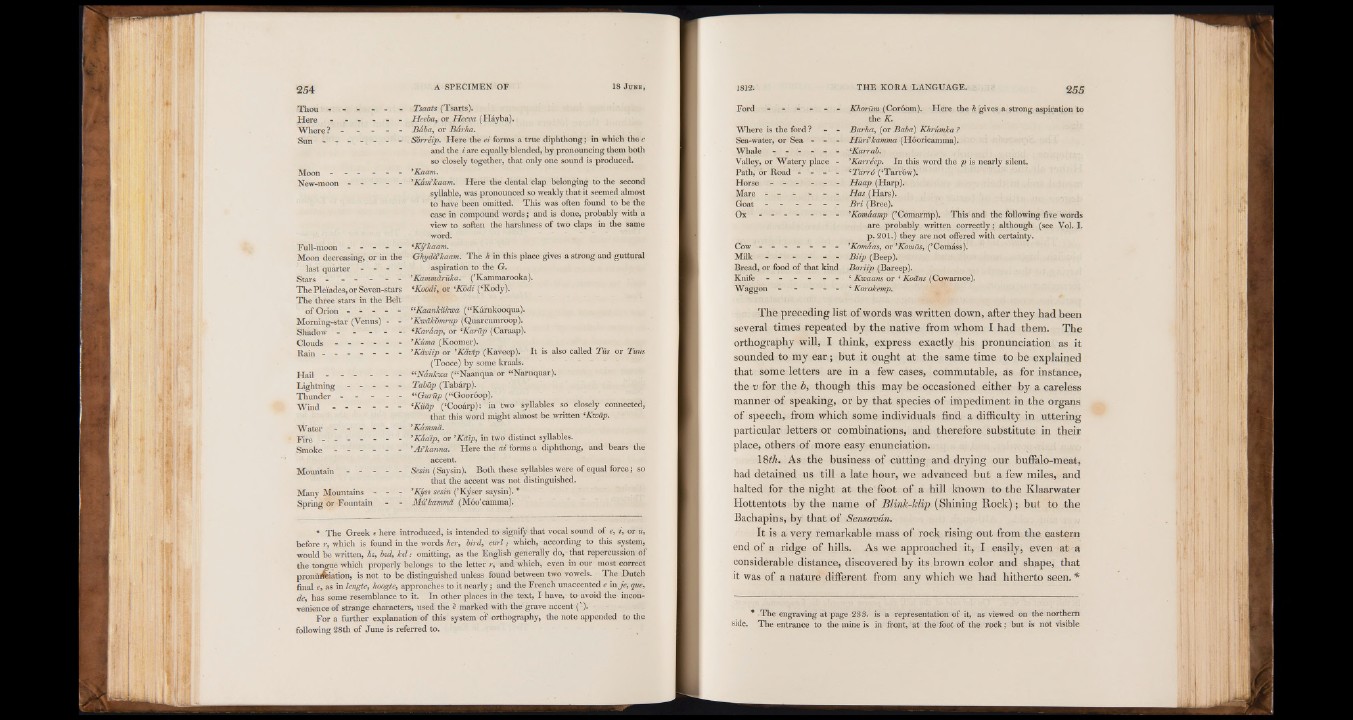
Thou .? - - - - - - Tsaats (Tsarts).
Here -., - - - - - Heeba, or Heeva (Hayba).
Where? - - - - B&ba, or Bdrha.
Sun - - - - - - - Sbrrdip. Here the ei forms a true diphthong; in which the c
and the i are equally blended, by pronouncing them both
so closely together, that only one sound is produced.
M o o n ...................................’Kaam.
New-moon - - - - - ’Kdm’kaam. Here the dental clap belonging to the second
syllable, was pronounced so weakly that it seemed almost
to have been omitted. This was often found to be the
case in compound words; and is done, probably with a
view to soften the harshness of two claps in the same
word.
Ful 1-moon - - - - ‘Ky’kaam.
Moon decreasing, or in the Ghyd&kaam. The h in this place gives a strong and guttural
last quarter - - - - aspiration to the G.
Stars - - - - - - ’Kamm&ruka. (’Kammarooka).
The Pleiades, or Seven-stars 4Koodi, or (Kodi (4Kody).
The three stars in the Belt
of Orion - - - - - 44Kaanlcuhwa (“Karnkooqua).
Morning-star (Venus) - - ’KvoaJcomrup (Quarcumroop).
Shadow - - - - - 'Karaap, or *Karap (Caraap).
Clouds - - - - - Rain -. 'Kdma (Koomer). ' ’Kaviip or ’Kamp (Kaveep). It is also called Tus or Tuns
(Tooce) by some kraals.
Hail - - - - - - “Ndnfcwa («Naanqua or “Narnquar).
L ig h tn in g ..........................Tabap (Tabarp).
T h u n d er“Gurup (“Gooroop).
Wind - - - - - - ‘Kiiap (‘Cooarp): in two syllables so closely connected,
that this word might almost be written ‘Ktaap.
Water - - - - - - 'Kammcl.
Fire ’Kdaip, or ’Kaip, in two distinct syllables.
S m o k e ..................................- ’Ailcanna. Here the at forms a diphthong, and bears the
accent.
M o u n ta in ...........................Sesin (Saysin); Both these syllables were of equal force J so
that the accent was not distinguished.
Many Mountains - - - 'Kyse sesin (’Kyser saysin). *
Spring Or Fountain - - Mu’Tcamna, (Moo’camma).
* The Greek e here introduced, is intended to signify that vocal sound of e, i, or u,
before r, which is found in the words her, bird, curl; which, according to this system,
would be written, he, bed, Jcel: omitting, as the English generally do, that repercussion of
the tongue which properly belongs to the letter r, and which, even in our most correct
prontrifeation, is not to be distinguished unless found between two vowels. The Dutch
final e, as in lengte, hoogte, approaches to it nearly; and the French unaccented e in je, que,
de, has some resemblance to it. In other places in the text, I have, to avoid the inconvenience
of strange characters, used the e marked with the grave accent ('-).
For a further explanation of this system of orthography, the note appended to the
following 28th of June is referred to.
Ford - - - - - - Khorum (Coroom). Here the h gives a. strong aspiration to
the K.
Where is the ford ? - - Barha, (or Baba) K/irumka ?
Sea-water, or Sea - - - H uri’kamma (H 6oricamma).
Whale - ' ■? :- - - - ; *Karrab. -
Valley, or Watery place - .KarrSep. In this word the p is nearly silent.
Path, or Road - - - - <Tarr<5 (4Tarr6w). "
Horse - - - - - Haap (Harp).
Mare - - - - - - Has (Hars). ,|
Goat - - - - - - B ri (Bree).
Ox - - - - - - - ’Komdamp (’Comarmp). This and the following five words
are probably written correctly; although (see Vol. I.
p. 201.) they are not offered with certainty.
Cow - - - - - - - *Komdas, o r’Komds, ^Com&s$).
Milk - - - - - - Biip (Beep).
Bread, or food of that kind Bariip (Bareep).
Knife - - - - ‘ Kwaans or 4 Koans (Cpwamce).
Waggon - - - - 4 Korokemp.
The preceding list of words was written down, after they had been
several times repeated by the native from whom I had them. The
orthography will, I think, express exactly his pronunciation as it
sounded to my ear; but it ought at the same time to be explained
that some letters are in a few cases, commutable, as for instance,
the v for the b, though this may be occasioned either by a careless
manner of speaking, or by that species of impediment in the organs
of speech, from which some individuals find a difficulty in uttering
particular letters or combinations, and therefore substitute in their
place, others of more easy enunciation.
18th. As the business of cutting and drying our buffalo-meat,
had detained us till a late hour, we advanced but a few miles, and
halted for the night at the foot of a hill known to the Klaarwater
Hottentots by the name of Blink-klip (Shining Rock); but to the
Bachapins, by that of Smsavdn.
It is a very remarkable mass of rock rising out from the eastern
end of a ridge of hills. As we approached it, I easily, even at a
considerable distance, discovered by its brown color and shape, that
it was of a nature different from any which we had hitherto seen. *
* -The engraving at page 23S. is a representation of il, as viewed on thè northern
side. The entrance to the mine is in front, at the foot of the rock ; but is not visible